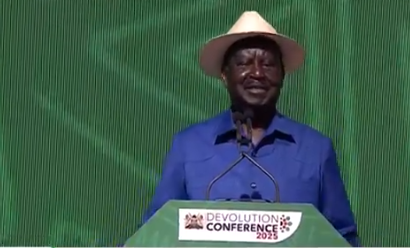

Former Prime Minister Raila Odinga has reiterated his unwavering support for a stronger devolution system, advocating for more and not less devolution.
Raila laid out a clear vision for the relationship between the national government and the 47 counties, emphasising the critical role of county assemblies in holding local executives accountable.
The Former Prime Minister reiterated that both levels of government must operate effectively without one dominating the other.
According to Raila, the primary responsibility for oversight lies with the elected representatives at the county level.
“I believe in devolution; I believe in more, not less devolution. I believe in a balance of power between Nairobi and the counties; neither should stand in the way of the other. I believe in strong county executives oversighted by equally strong county assemblies,” he said.
“County governments are supposed to be oversighted by county assemblies, not the Senate. It is unnecessary for the Senate to be summoning Governors to appear before Senators in Nairobi.”
Raila criticised the practice of senators summoning governors, saying it is unnecessary for the Senate to be summoning governors to appear before Senators in Nairobi.
Raila’s sentiments come amid ongoing debates about the roles of devolution and the powers of various oversight bodies.
According to the constitution, a county assembly may receive and approve plans and policies for the management and exploitation of the county’s resources, and the development and management of its infrastructure and institutions.
The accounting officer of a national public entity is accountable to the National Assembly for its financial management, and the accounting officer of a county public entity is accountable to the county assembly for its financial management.
The Constitution expressly confers on the Senate the power to exercise oversight over national revenue allocated to county governments.
However, a further consideration of the provisions of Article 94(4) of the Constitution indicates that Parliament (consisting of the Senate and the National Assembly) has a wider role of “protecting the Constitution and promoting the democratic governance of the Republic”.
The oversight role of the Senate does not only involve oversight over county governments and other agencies in the devolution structure, but also involves oversight over the conduct of certain state officers.













